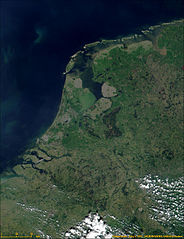On the British BBC, shadow Treasury minister Cathy Jamieson said:
"These figures show the full scale of David Cameron's cost of living crisis.......Working people are not only worse off under the Tories, we're also doing much worse than almost all other EU countries."
In the Dutch newspaper De Telegraaf, one of their financial columnists Harry Geels writes about the ongoing "impoverishment" of Holland, which according to Geels actually started in the 1990s and was partially caused by accepting too low of an exchange rate for the Dutch guilder, when it joined the new Euro in 2000 (to understand the background of this too low exchange rate, Dutch readers can read his report "De Wisselverlieszaak" (or "The Case of the Exchange rate Loss".)
As so often is the case, economics influences politics, and Oxford University economics professor Simon Wren Lewis, describes the similarities in political trends in both countries,
where support for the far right is increasing, even though the far right has not had a meaningful influence in those countries for a long time. According to a recent Dutch poll, the PVV (i.e. the Freedom party) with its leader Geert Wilders would double its seats from 15 to 29 in the 150 seat parliament, and replace the governing VVD (i.e. the right of center Liberal Party) as the largest party. The Liberals of Dutch prime minister Mark Rutte would lose 21 seats reducing their current 42 to 21 seats.
In the UK, the UK Independence party (i.e. UKIP) has emerged in the meanwhile as a viable right-wing threat to the governing Conservative Party of prime minister David Cameron. Wren Lewis describes why the support for the right wing is growing in those two countries - and not for example in France -:
"In both the
UK and the Netherlands we have recession and fiscal austerity, where the
recession has been associated with marked falls in real wages as well as
increases in unemployment. In both cases I would argue that there has been no
effective opposition to fiscal austerity from the political centre, which helps
encourage support for the political extremes."
And he ends up by blaming the "stupidity of the pro-cyclical fiscal policy' (i.e.austerity measures during a recession) for those economic problems, a policy which is supported by most of the European political establishment and the current governments in the Netherlands and the UK. But this same policy is opposed by an interesting mix of the majority of economists questioned and the upcoming extreme parties on the right (and on the left.)
Although I agree with Wren Lewis that the current fiscal policies seem not to be working (for example, the situation in Greece, Portugal and Spain doesn't seem tenable much longer for the local population,) I'm
not sure whether I agree with his analysis that the right-wing will increase its power in the Netherlands. Clearly, the Dutch electorate is not happy with the economic
situation, but over the last 10 years they have shown a volatility in
the polls, which doesn't always translate into actual votes for the extreme parties. Secondly, if what Wren Lewis claims is true for the Netherlands, then the far right should be much stronger in coutries with bigger economic problems and higher unemployment levels, such as Greece, Portugal, Spain, France, Italy etc. Whether UKIP can really become a major party in the U.K. also remains to be seen, considering the challenges of the British plurality voting system. Also, one can wonder how far right this party is: they're basically occupying the Conservatives' territory. I think it's too early to believe that the tale of two countries, in the Netherlands and the UK, is accurate and indicative of a wider European trend, but clearly the clock is ticking for the economic policy makers.

No comments:
Post a Comment